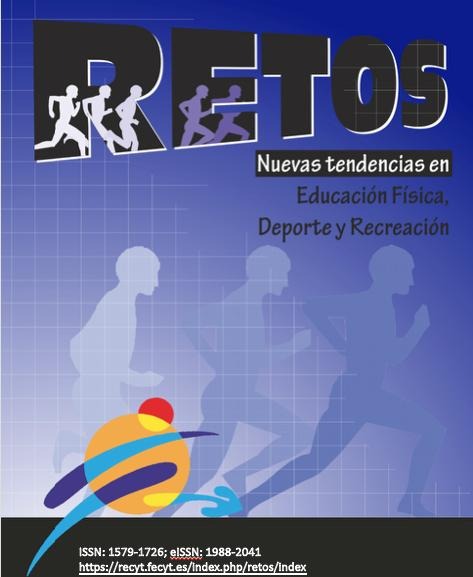Desporto, recreação e inteligência emocional: um estudo bibliométrico sobre a sua relação com o desempenho académico (2000–2024)
DOI:
https://doi.org/10.47197/retos.v73.117603Palavras-chave:
Desempenho académico, inteligência emocional, recreação, esportesResumo
Introdução: A ligação entre desporto, recreação e inteligência emocional é um campo de crescimento que, nas últimas duas décadas, ganhou relevância pela influência dos fatores emocionais e comportamentais no desempenho académico.
Objectivo: analisar, através de um enfoque bibliométrico, a produção científica publicada entre os anos 2000 e 2024 que aborda a relação entre desporto, recreação, inteligência emocional e desempenho académico.
Metodologia: adotou uma abordagem bibliométrica, sustentada em técnicas de revisão sistemática e análise documental.
Resultados: na primeira década (2000–2010) os estudos são escassos e centram-se sobretudo nas explorações iniciais sobre a inteligência emocional e desportiva, a partir de 2015 observa-se um incremento significativo, particularmente na publicação de revisões sistemáticas e metaanálisis.
Discussão: os hallazgos evidenciam um aumento progressivo de publicações, com prevalência de revisões sistemáticas e estudos correlacionais no âmbito universitário, mas persistem vazios na diversidade geográfica, integração de variáveis e ausência de estudos longitudinais.
Conclusões: se cumprido com o objetivo de identificar as tendências de publicação, os hallazgos mostram que a partir do ano de 2010 se intensificou o interesse por estas temáticas, alcançando o seu maior número de publicações na última década, o que refletiu a consolidação da inteligência emocional como um fator chave dentro do âmbito educativo e desportivo.
Referências
Active Living Research. (2015). Active Education: Growing Evidence on Physical Activity and Academic Performance (Research Brief). [Archivo en PDF] https://activelivingresearch.org/sites/activelivingresearch.org/files/ALR_Brief_ActiveEducation_Jan2015.pdf
Álvarez, C., Pesce, C., Cavero, I., Sánchez, M., Garrido, M., & Martínez, V. (2017). Academic Achievement and Physical Activity: A Meta-analysis. Pediatrics, 140(6). https://doi.org/10.1542/peds.2017-1498
Bisquerra, R. (2009). Metodología de la investigación educativa (2.ª ed.). La Muralla.
Dobersek, U., & Arellano, D. (2017). Investigating the Relationship between Emotional Intelligence, Involvement in Collegiate Sport, and Academic Performance. Research, Sports Coaching, 28. https://thesportjournal.org/article/investigating-the-relationship-between-emotional-intelligence-involvement-in-collegiate-sport-and-academic-performance/
Ghareh, A., & Hamid, M. (2023). The relationship between cognitive, emotional and social intelligence with the academic performance of physical education students. Journal of Population Therapeutics & Clinical Pharmacology, 30(12), 1-8. https://doi.org/10.47750/jptcp.2023.30.12.001
Hernández, R., Fernández, C., & Baptista, P. (2014). Metodología de la investigación (6.ª ed.). McGraw-Hill.
Jadjav, R. (2023). A comparative study of emotional intelligence among the college athletes and non-athletes. International. Journal of Physical Education, Sports and Health, 10(5), 18-22. https://doi.org/10.22271/kheljournal.2023.v10.i5a.3062
Koop, A., & Jekauc, D. (2018). The Influence of Emotional Intelligence on Performance in Competitive Sports: A Meta-Analytical Investigation. Sports, 6(4), 175-181. https://doi.org/10.3390/sports6040175
Laborde, S., Brull, A., Weber, J., & Anders, L. (2011). Trait emotional intelligence in sports: A protective role against stress through heart rate variability? Personality and Individual Differences, 51(1), 23-27. https://doi.org/10.1016/j.paid.2011.03.003
Lott, G., & Turner, B. (2018). Collegiate Sport Participation and Student-Athlete Development through the Lens of Emotional Intelligence. Journal of Amateur Sport, 4(3), 1-28.- https://doi.org/10.17161/jas.v4i2.7111
MacCann, C., Jiang, Y., Brown, L., Double, K., Bucich, M., & Minbashian, A. (2020). Emotional intelligence predicts academic performance: A meta-analysis. Psychological Bulletin, 146(2), 150-186. https://doi.org/10.1037/bul0000219
Mercader, I., & Gutiérrez, N. (2023). The Importance of Emotional Intelligence in University Athletes: Analysis of Its Relationship with Anxiety. International Journal of Environmental Research and Public Health, 20(5), 1-16. https://doi.org/10.3390/ijerph20054224
O’Neill, K. (2021). Emotional intelligence and mental well-being among college student athletes. [Tesis de postgrado, Denison University]. https://digitalcommons.denison.edu/studentscholarship/49
Sánchez, N., Berrios, M., & Extremera, N. (2020) A Meta-Analysis of the Relationship Between Emotional Intelligence and Academic Performance in Secondary Education: A Multi-Stream Comparison. Frontiers in Psychology, 11, 1-11. https://doi.org/10.3389/fpsyg.2020.01517
Sember, V., Jurak, G., Kovač, M., Morrison, S., & Starc, G. (202). Children's Physical Activity, Academic Performance, and Cognitive Functioning: A Systematic Review and Meta-Analysis. Frontiers in Public Health, 8, 1-17. https://doi.org/10.3389/fpubh.2020.00307
Shengyao, Y., Xuefen, L., Salarzadeh, H., Samsudin, N., Chunchun, K., & Ishak, Z. (2024). Emotional intelligence impact on academic achievement and psychological well-being among university students: the mediating role of positive psychological characteristics. BMC Psychol, 12, 389. https://doi.org/10.1186/s40359-024-01886-4
Slade, A., & Kies, S. (2015). The relationship between academic performance and recreation use among first-year medical students. Medical Education Online, 20(1). https://doi.org/10.3402/meo.v20.25105
Tapia, M., & Marsh, G. (2006). The effects of sex and grade-point average on emotional intelligence. Psicothema, 18, 108-111. https://www.psicothema.com/pdf/3284.pdf
Wang, K., Yang, Y., Zhang, T., Ouyang, Y., Liu, B., & Luo, J. (2020). The Relationship Between Physical Activity and Emotional Intelligence in College Students: The Mediating Role of Self-Efficacy. Frontiers in Psychology, 11, 1-11. https://doi.org/10.3389/fpsyg.2020.00967
Zoghlami, W., Hawani, A., Khiari, H., Mnedla, S., Marsigliante, S., Elloumi, A., & Muscella, A. (2023). The relationship between emotional intelligence, anxiety, and performance in physical education and sport students. Frontiers in Psychology, 14, 1-7. https://doi.org/10.3389/fpsyg.2023.1236070
Downloads
Publicado
Edição
Secção
Licença
Direitos de Autor (c) 2025 María Dolores Laínez Villao, Ana Patricia Cevallos Suarez, Bertha Elizabeth Vera Rodríguez, Johanna Lilibeth Alcivar Ponce

Este trabalho encontra-se publicado com a Licença Internacional Creative Commons Atribuição-NãoComercial-SemDerivações 4.0.
Autores que publicam nesta revista concordam com os seguintes termos:
- Autores mantém os direitos autorais e assegurar a revista o direito de ser a primeira publicação da obra como licenciado sob a Licença Creative Commons Attribution que permite que outros para compartilhar o trabalho com o crédito de autoria do trabalho e publicação inicial nesta revista.
- Os autores podem estabelecer acordos adicionais separados para a distribuição não-exclusiva da versão do trabalho publicado na revista (por exemplo, a um repositório institucional, ou publicá-lo em um livro), com reconhecimento de autoria e publicação inicial nesta revista.
- É permitido e os autores são incentivados a divulgar o seu trabalho por via electrónica (por exemplo, em repositórios institucionais ou no seu próprio site), antes e durante o processo de envio, pois pode gerar alterações produtivas, bem como a uma intimação mais Cedo e mais do trabalho publicado (Veja O Efeito do Acesso Livre) (em Inglês).
Esta revista é a "política de acesso aberto" de Boai (1), apoiando os direitos dos usuários de "ler, baixar, copiar, distribuir, imprimir, pesquisar, ou link para os textos completos dos artigos". (1) http://legacy.earlham.edu/~peters/fos/boaifaq.htm#openaccess


